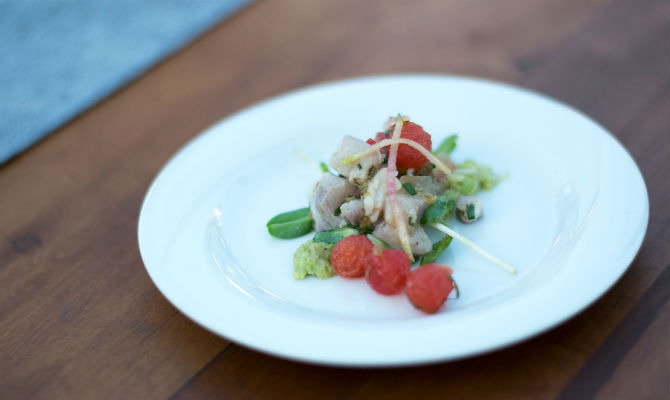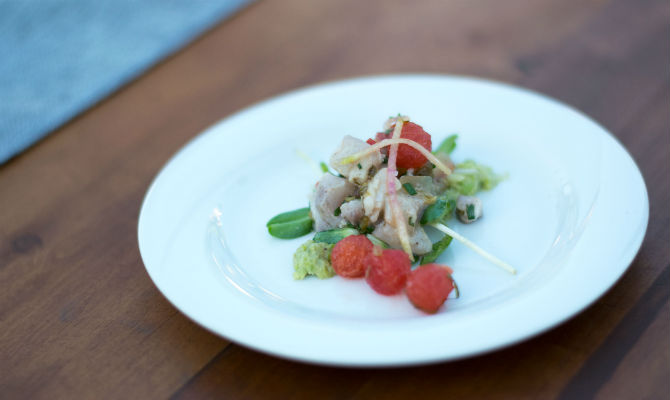On A Fishing Charter With A Chef At Amelia Island, Florida
It was 7 a.m. when our small fishing charter pulled away from the dock and headed out to fish the backwaters of the northeast Florida coast, off of Amelia Island. As the boat picked up speed, it bobbed up and down over the small waves rippling across the inlet, and I could feel the tequila from the night before stirring in my stomach. Other than our captain, Greg, my one companion on the boat was Kathleen Blake, a 2015 James Beard semifinalist and chef and owner of the Rusty Spoon in Orlando, Florida. She said she took it easy the night before during our tequila tasting because she knew fishing at 6 a.m. wasn't the time to have a hangover. Not to mention, she had to catch the right kind of fish to create a winning dish for the Omni Amelia Island Resort Plantation's Fish to Fork weekend.
Blake was one of six chefs competing to win the Fish to Fork weekend cook-off, for which the chefs had to randomly select one of three types of fishing common off the Florida coast — backwater, deep sea, and fly fishing — and then create dishes with whatever they caught. The idea makes a lot of sense, not only because Florida has access to some of the best seafood along the coast, but also because all of the chefs invited to Fish to Fork have a commitment to sourcing their ingredients locally and building relationships with farmers and fishermen.
Blake told me that that's why the trip intrigued her: because you "have to go out and utilize what was there in front of you," which is what Blake does every day when she sources food for the Rusty Spoon. She said she meets each fisherman and farmer personally to talk with them about their philosophy and, most importantly, about sustainability.
This respect for the local community and the environment all started when Blake was growing up in a small town in northeast Iowa. Blake is one of five children, and her uncle had 10 children. Every Sunday, her uncle, a pharmacist, would close his shop early and drive to Blake's grandmother's house, where they would all get together for Sunday supper.
"My two sisters and I would go to Grandma's on Thursday night and we would start getting things ready for Sunday," Blake said. "That was the closure of the weekend — to have all of us together."
Blake said her grandmother roasted a whole turkey or created elaborate Jell-O salads. For dessert, she made graham cracker pie, cobbler, or an "amazing" butterscotch cake. Blake, who moved to San Francisco when she was 17 to pursue a culinary career, said her grandmother's attention to detail has stuck with her throughout her years as a chef. (She still has her grandmother's serving spoon on her cooking station at The Rusty Spoon.) She said her grandmother kept cookies that were too crisp for herself and only served the ones that were "most perfect." She ironed tablecloths before family meals and polished the silver. She even scraped off burnt toast before feeding it to the birds.
"She always scraped all the burnt off, you know, like the birds would come knocking at the door and say, 'Hey, we don't like your toast,'" Blake said.
Even Blake's parents made a year-round commitment to using their resources wisely. Her father sold farm equipment and her mother was a teacher. In the summers, Blake and her siblings would stand underneath the family's apple tree — because apples could go a long way in her family.
"My grandmother would do a week or two weekends of pie baking and applesauce making. Then we'd have pies all through the fall," Blake said. "My dad would buy half a cow or half a pig and we worked out of the freezer."
On the boat, Blake talked a lot with the captain about regulations that specify when certain fish are in season or how big or small the fish must be to keep. We started fishing with Greg at 7 a.m., and by the time we had finished at noon, we had fished at about seven or eight different spots that Greg frequented. When we were fishing, he pointed out specific points where he "got a pretty good-sized trout" or where the flounder liked to bite. Flounder, Greg told me repeatedly, are "really lazy eaters," while redfish, the fish Blake and I caught the most of, are more aggressive eaters.
After the trip, Blake told me that Greg was "so diligent." We caught a trout that was a quarter inch too short to keep, and Greg checked the fish's length three times before throwing it back in the water.
"The livelihood of fishermen is something I think about," Blake said. "If he wasn't known as a fisherman that gets good catch, then that hurts his business. He knew every little nook of where we were."
We were fishing close to a small barge holding equipment that Greg said was used for dredging when Blake got a bite. "Reel! Reel! Reel!" Greg yelled at us whenever our bobbers went under water for even a second. Blake reeled, but the fish fought. Finally, when she got him up to the boat, Greg pulled out a net and scooped up the 19-inch redfish, which bent the rod as Blake hauled him in.
We caught two redfish and one flounder that day, but the Fish to Fork rules said Blake had to use the redfish because we caught more of it. She said the resulting dish, "Sweet & Tart Redfish," was inspired by what she saw that day during our fishing expedition. She didn't want to overpower the great flavor of the redfish, which she said tasted similar to snapper. She aimed for simplicity. The dish featured watermelon balls, watermelon rind, smashed fava beans, lime, and sunflower sprout.
"I wanted each layer to have the sweet of the watermelon ball but then also the sort of tartness of pickling the watermelon rind," Blake said. "Using the entire watermelon — that was really important. Then also just the crispness of the sunflower sprouts. To me, that was like the grass, because we were fishing in so much grass."
The fishing experience, which is available to VIP Fish to Fork guests, was the perfect creative challenge for chefs who are excited by the gamble of only using what's around them. As a chef, and as a fisherman, Blake is flexible and resourceful. When I showed up at her table during the individual Fish to Fork competition, she was plating dishes like a mad culinary scientist. When she looked up she yelled my name excitedly and asked me to move over to the side of the table, because they had a special dish just for me that used the flounder I had caught. I thought it was a true testament to her parents' and grandmother's influence that she saved it to serve to me.
When the man who stood behind me in line asked, "Hey, why does she get that fish?" Chef Blake replied with a matter-of-fact, "Because she caught it."

